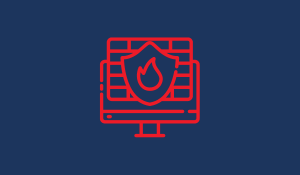The Ultimate Guide to IT Firewalls
Are you ready to fortify your digital defenses and safeguard your network from cyberattacks? Look no further than the network firewall. A formidable...
6 min read
 DriveLock
Jan 31, 2025 10:57:48 AM
DriveLock
Jan 31, 2025 10:57:48 AM

Traditional methods of protecting network perimeters are increasingly being eclipsed by sophisticated threats and the dynamic nature of modern IT environments. This is where Firewall as a Service (FWaaS) comes in, a cutting-edge solution that promises to revolutionize the way companies protect their digital assets.
| CONTENT |
By harnessing the power of the cloud, FWaaS offers unprecedented scalability, flexibility and centralized management, making it an essential tool for organizations looking to stay one step ahead of cyber attackers. In this blog post, we explore why FWaaS is not just a trend, but the future of cybersecurity and how it can provide the robust, adaptable protection organizations need today.
Firewall as a Service (FWaaS) is a cloud-based firewall service that provides security features on a subscription basis. This means you don't have to buy and maintain your own physical firewall hardware or software, which can be expensive and complex to manage.
Instead , with FWaaS you can easily manage and protect your network by subscribing to a cloud-based firewall service from a provider. The provider usually takes care of installing, maintaining and updating the firewall for you and provides you with a user-friendly interface to manage your firewall rules and policies.
FWaaS can also provide advanced security features such as intrusion detection/prevention, VPN connectivity and content filtering, which can protect your network from a range of cyber threats. In addition, FWaaS can be easily scaled up or down to meet your changing network security needs, making it a flexible and cost-effective way to manage your network security.
Understanding the evolution of firewall technology is crucial for building a robust cybersecurity strategy. While the fundamental purpose of a firewall remains to control network traffic and prevent unauthorized access, different generations and deployment models have emerged to address evolving threats and infrastructure needs. This paragraph will introduce three key types of firewalls: the traditional or "normal" firewall, the more advanced Next-Generation Firewall (NGFW), and the cloud-delivered Firewall as a Service (FWaaS), highlighting their core differences.
| Feature | Firewall | Next-Generation Firewall | Firewall as a Service |
| Core Functionality | Primarily focuses on stateful packet inspection, controlling traffic based on port and protocol. | Includes all traditional firewall capabilities plus deep packet inspection (DPI) and application awareness/control. | Offers core firewall functionalities, often including stateful inspection, and typically integrates additional security services in the cloud. |
| Inspection Level | Primarily operates at Layer 3 (Network) and Layer 4 (Transport) of the OSI model. | Operates up to Layer 7 (Application) of the OSI model, allowing for content and application-level analysis. | Typically performs inspection up to Layer 7, leveraging cloud-based resources for analysis. |
| Threat Detection | Basic filtering based on predefined rules for ports and protocols. Limited visibility into application content. | Advanced threat detection through DPI, signature-based IPS, and often heuristic/behavioral analysis. May include threat intelligence feeds. | Often includes intrusion prevention (IPS), URL filtering, and may integrate advanced threat protection and threat intelligence from the cloud provider. |
| Application Awareness | Limited or no ability to identify and control specific applications. | Can identify and control traffic based on specific applications, regardless of the port or protocol being used. | Often provides application-level filtering and control as part of its feature set. |
| Deployment Model | Typically a physical hardware appliance or software installed on-premises. | Usually a physical hardware appliance or a virtual appliance deployed on-premises or in a private/public cloud environment managed by the organization. | Cloud-based service delivered and managed by a third-party provider. Infrastructure is off-premises. |
| Scalability & Elasticity | Scalability often requires hardware upgrades or manual configuration adjustments. Elasticity is generally limited. | Scalability can be achieved but often requires hardware upgrades or adjustments to virtual machine resources. Elasticity might be more limited compared to cloud-native solutions. | Highly scalable and elastic, easily adapting to changing network traffic demands without significant infrastructure changes. |
To understand how Firewall as a Service (FWaaS) works, you need to know how this cloud-based security solution is integrated into and protects an organisation's network infrastructure.
Unlike traditional firewalls that are installed on-site, FWaaS utilises the cloud to provide scalable and flexible security measures that ensure comprehensive protection for all digital assets.
Cloud deployment: FWaaS is hosted in the cloud, which means there are no physical firewall devices to manage or maintain on site. The firewall functions are provided via a cloud platform managed by the service provider.
Routing of data traffic: The network traffic is routed through the infrastructure of the FWaaS provider. This can include traffic from local systems, remote users and cloud-based applications. The service checks this traffic for threats and enforces security policies before forwarding it to its destination.
Centralised administration: FWaaS provides a centralised management console that is usually accessible via a web interface. Administrators can configure security policies, monitor traffic and manage firewall rules from a single location. This simplifies administration, especially for companies with distributed networks.
Scalability: As it is a cloud-based solution, FWaaS can be easily scaled to cope with increasing traffic volumes and growing business requirements. This scalability is often more cost-effective than upgrading physical firewall hardware.
Advanced security functions: FWaaS often includes advanced security features such as:
Intrusion Detection and Prevention Systems (IDPS): Monitors network traffic for suspicious activity and can take action to block threats.
Secure Web Gateway (SWG): Provides protection against web-based threats and enforces web access policies.
Data Loss Prevention (DLP): Protects sensitive data by monitoring and controlling data transmissions.
Zero Trust Network Access (ZTNA): Ensures that only authenticated and authorised users can access certain network resources.
Integration with other security services: FWaaS can be integrated with other cloud-based security services, such as Secure Access Service Edge (SASE) solutions, to create a comprehensive security posture. This integration helps to implement a layered defence strategy.
Automated updates and patches: As the service is managed by the provider, updates and security patches are applied automatically. This ensures that the firewall is always equipped with the latest security functions and measures.
By routing network traffic through the provider's infrastructure and applying advanced security protocols, FWaaS ensures robust, real-time protection for the entire organization, making it a key component in modern cyber security strategies.
Firewall as a Service (FWaaS), or cloud firewall, offers a modern, flexible and scalable alternative to traditional firewalls. By utilizing cloud technology, FWaaS offers companies improved security, lower costs and simplified management. The benefits of FWaaS make it clear why it is considered the future of cybersecurity as organizations evolve and embrace digital transformation.
Scalability: Companies can quickly adapt to changing requirements, such as increased traffic or the establishment of new branch offices, without incurring high costs or logistical challenges.
Cost efficiency: No large upfront investment in hardware and software is required, and ongoing maintenance costs are lower as the service provider is responsible for updates and patches.
Increased security: Companies benefit from comprehensive, up-to-date security measures that protect against a wide range of threats without the need for complex on-site solutions.
Centralized management: A centralized management console allows administrators to monitor and control security policies for the entire network from a single interface
Improved flexibility: Organizations can maintain reliable security regardless of the location of their employees or resources, enabling a more flexible and productive working environment.
Automatic updates and maintenance: The service provider takes care of all updates, patches and maintenance tasks. This ensures that the firewall is always up to date with the latest security features and threat intelligence, reducing the burden on internal IT teams and minimizing the risk of security breaches.
Global accessibility: Companies with multiple offices or employees in other locations can ensure the same level of security and policy enforcement worldwide, improving the overall security posture.
Rapid deployment: FWaaS can be deployed and configured quickly compared to traditional hardware-based firewalls. This allows organizations to deploy robust security measures in a fraction of the time, reducing the time to protection and reducing the risk window for transitions or expansions.
Reduced complexity: With FWaaS, organizations don't have to manage multiple hardware appliances or complex configurations. This simplifies the network architecture, making it easier to manage and less prone to misconfiguration.
Compliance and reportingThis makes it easier for companies to ensure compliance with industry standards and regulations, avoid potential fines and improve their security posture.
Firewall as a Service offers numerous benefits for businesses, including scalability, cost efficiency, enhanced security, centralized management and improved flexibility. These benefits make FWaaS an attractive option for companies looking to modernize their security infrastructure and adapt to the evolving threat landscape.
Firewall as a Service (FWaaS) is poised to become the future of cybersecurity for organizations due to its unparalleled scalability, cost-effectiveness and comprehensive security features. As organizations increasingly adopt cloud-based infrastructures and remote working models, traditional hardware-based firewalls are struggling to keep up with the dynamic and distributed nature of modern networks.
FWaaS, with its cloud-native design, provides seamless protection across all locations and devices, ensuring consistent security policies and real-time threat detection. In addition, FWaaS' centralized management and automatic updates reduce the administrative burden on IT teams, allowing them to focus on strategic initiatives rather than routine maintenance.
By integrating advanced features such as Zero Trust Network Access (ZTNA) and Secure Web Gateways (SWG), FWaaS provides a robust, adaptable security framework that can evolve with the ever-changing threat landscape, making it an essential tool for future-proof cybersecurity strategies.
In summary, Firewall as a Service represents a fundamental shift in the way organizations approach network security. By providing scalable, flexible and comprehensive protection through cloud-based solutions, FWaaS enables organizations to stay one step ahead of evolving cyber threats.
The use of FWaaS not only increases security, but also simplifies management and reduces costs, making it an essential component of a modern cyber security strategy. As the digital landscape continues to evolve, FWaaS will become the cornerstone of robust and resilient enterprise security.

Are you ready to fortify your digital defenses and safeguard your network from cyberattacks? Look no further than the network firewall. A formidable...

Welcome to a deep dive into the world of cybersecurity and network defence. In an era where the digital landscape is as dynamic as it is...

While firewalls, antivirus software, and intrusion detection systems serve as essential security layers, human error remains the weakest link in...